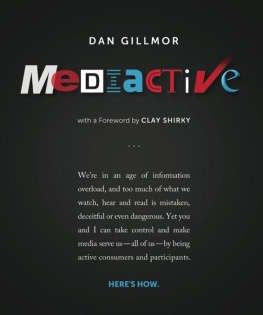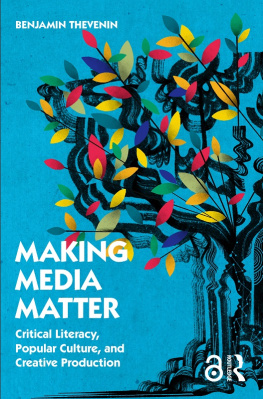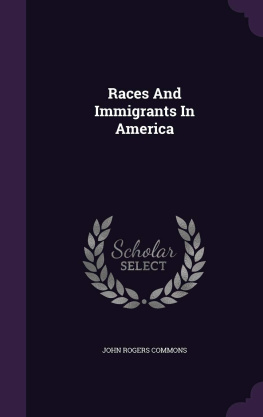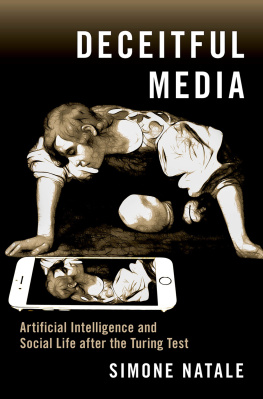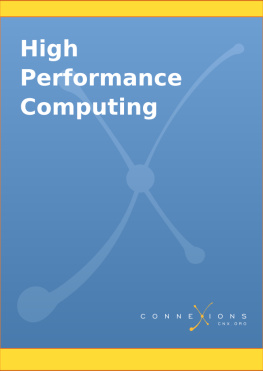Dan Gillmor - Mediactive
Here you can read online Dan Gillmor - Mediactive full text of the book (entire story) in english for free. Download pdf and epub, get meaning, cover and reviews about this ebook. year: 2010, publisher: Lulu.com, genre: Politics. Description of the work, (preface) as well as reviews are available. Best literature library LitArk.com created for fans of good reading and offers a wide selection of genres:
Romance novel
Science fiction
Adventure
Detective
Science
History
Home and family
Prose
Art
Politics
Computer
Non-fiction
Religion
Business
Children
Humor
Choose a favorite category and find really read worthwhile books. Enjoy immersion in the world of imagination, feel the emotions of the characters or learn something new for yourself, make an fascinating discovery.
- Book:Mediactive
- Author:
- Publisher:Lulu.com
- Genre:
- Year:2010
- Rating:4 / 5
- Favourites:Add to favourites
- Your mark:
- 80
- 1
- 2
- 3
- 4
- 5
Mediactive: summary, description and annotation
We offer to read an annotation, description, summary or preface (depends on what the author of the book "Mediactive" wrote himself). If you haven't found the necessary information about the book — write in the comments, we will try to find it.
Mediactive — read online for free the complete book (whole text) full work
Below is the text of the book, divided by pages. System saving the place of the last page read, allows you to conveniently read the book "Mediactive" online for free, without having to search again every time where you left off. Put a bookmark, and you can go to the page where you finished reading at any time.
Font size:
Interval:
Bookmark:

Mediactive
By Dan Gillmor
Copyright 2010 Dan Gillmor
ISBN 978-0-557-78942-9
Mediactive by Dan Gillmor is licensed under a Creative Commons Attribution-NonCommercial-ShareAlike 3.0 United States License. To view a copy of this license, visit http://creativecommons.org/licenses/by-nc-sa/3.0/us/ -- or contact Creative Commons at 171 Second St, Suite 300; San Francisco, CA 94105 USA (phone +1-415-369-8480). Permissions beyond the scope of this license may be available at http://mediactive.com/cc.
Contents
Foreword v
Epilogue, and Thanks 209
Acknowledgments 214
Foreword
By Clay Shirky
As print and broadcast give way to the Digital Age, the media are in upheaval. The changes have sparked fascination, confusion and perilespecially when it comes to news, which is so essential in democracies.
We need a media environment that serves us, both as individuals and as a society. Yet turmoil in journalism threatens our ability oversee the people who act on our behalf. Media participation is critical to avoiding this threat: not just to keep politicians in check but also to balance the power of the whole crazy range of people we rely onpolice and doctors and energy executives and pharmaceutical researchers and bankers, and all the other people who make decisions that affect us without requiring or allowing our direct input. Solid journalism helps keep those people working on our behalf (and it keeps us honest, when we work on behalf of others).
The turmoil is inspiring large numbers of ideas and experiments from people who know the risks and want to help create a valuable media in this new century. The experiments fascinate me as a writer on media and the Internet, and they fascinate my students at New York University and Harvard. They differ in small and large ways, but most have at least one thing in common: They imagine trying to fix the supply of news, either by vetting or filtering sources in such a way as to preserve the old, relatively passive grazing habits of 20th century news consumers.
Dan Gillmor, as you will see in this book, takes a very different approach. Dan doesnt make upgrading the sources, or the gatekeepers, or the filtersor any other them in the media ecosystemhis only or even primary goal. Dan wants to upgrade us , so we can do our own part. He wants us to encourage media to supply better information by helping us learn to demand better information. And he wants us to participate as creators.
Dans proposal for making news useful to us, as citizens and consumers, is the most ambitious one going. He wants us to become mediactive active users of mediato help us live up to the ideal of literacy. Literacy, in any medium, means not just knowing how to read that medium, but also how to create in it, and to understand the difference between good and bad uses.
Dans conception here is extraordinarily broad. Although he is a journalist, and is concerned with journalism and society, he conceives of media and our engagement with it across a broad range of behaviors, attitudes and tools we need to adopt. He offers a framework, first, for thinking of ourselves as active consumers, with the necessary virtues of skepticism and patience with complex stories, and with very practical guidelines for making judgments about the trustworthiness of stories and sources.
His framework then extends to us as producers, offering a simple but informative guide to many of the ways that we can now make our own media and put it out in public, advising each of us to participate on the network and also to have a home base online that we control. He offers advice on making the media we create visible to the people we want to see it (today, visible means findable). And in furthering his commitment to the active part of being mediactive, he offers suggestions on how each of us can be a trustworthy source of information, beyond simply vetting others for trustworthiness.
Dans framework includes not just individual action but group action. As more and more of our information and opinions about the world are filtered through social networks, the book sets out ideas for being a good community participant, passing along not just links but context to one anotherbeing as good at sharing and interpreting media for one another as we are for ourselves. And it takes group action to the highest order of aggregation: what kind of society we want to be, given our access to these new tools and to their attendant freedoms.
Dan has an extraordinary resume. He was the technology and business columnist for Silicon Valleys hometown paper, the San Jose Mercury News , both before and during the Internet boom. He was an early blogger, and one of the first to blog as part of his newspapering duties. He wrote a book on citizen media when almost no one had heard of the idea. Hes run an academic program dedicated to treating journalism as an engaged and entrepreneurial field open to innovation, rather than a craft simply practiced by existing institutions. And hes been a participant in various media startups, as a founder, advisor and investor.
Hes had, in other words, a ringside seat for some of the biggest tech-inflected changes in the journalism world, as an observer, a practitioner and a theorist. He knows what a revolution looks like, he knows the long odds against any revolution actually coming to fruition, and he knows when its worth trying anyway, despite the long odds.
The obvious thing to say is that most plans this audacious usually fail. A less obvious but more important thing to say is that most is not the same as all; a few plans as big as Dans do succeed.
The value in trying something like this isnt just the likelihood of success vs. failure, but that likelihood times the value created if we do indeed succeed. The possibility of making enough citizens mediactive to make journalism good because we demand that it be good, the possibility that a small but passionate group of both producers and users of journalism will become the people to do the work of holding societys powerful to accountwell, that would be something of very great value indeed.
Of the current revolution, Dan says its going to be messy, but also exciting. He knows what hes talking about. We would all do well to listen.
Clay Shirky (shirky.com) is a researcher, teacher and author whose latest book is Cognitive Surplus: Creativity and Generosity in a Connected Age.
A Note to Readers
In the pages that follow, youll see that Ive underlined many words and phrases. These signify hyperlinks in the online and e-book versions.
Since the entire book will be published online, this will enable you to quickly go to the Mediactive.com website and then on to the source material to which Ive linked. Im doing this instead of voluminous footnotes and endnotes, and for this project it feels like a better approach. (Not everything I know comes from the Internet, of course, and Ive made clear in the text when Im quoting from an interview or a non-online source.)
Why this technique? As youll see, this project is not only the book youre holding. It very much includes the e-book versions and online material, and the latter, in particular, goes well beyond whats in the print edition. Think of this book as the easy-to-read, paper portion of the larger work.
Youll observe, meanwhile, that theres no index. Thats also deliberate. Since the book will be online, all you have to do is a quick search. In the end, Google and other search engines are my indexes, anyway.
Finally, if you spot a mistake, let me know. Send me email at . If I agree its an error, Ill correct it online and in the next edition; and Ill list you as a valued friend of accuracy.
Next pageFont size:
Interval:
Bookmark:
Similar books «Mediactive»
Look at similar books to Mediactive. We have selected literature similar in name and meaning in the hope of providing readers with more options to find new, interesting, not yet read works.
Discussion, reviews of the book Mediactive and just readers' own opinions. Leave your comments, write what you think about the work, its meaning or the main characters. Specify what exactly you liked and what you didn't like, and why you think so.

